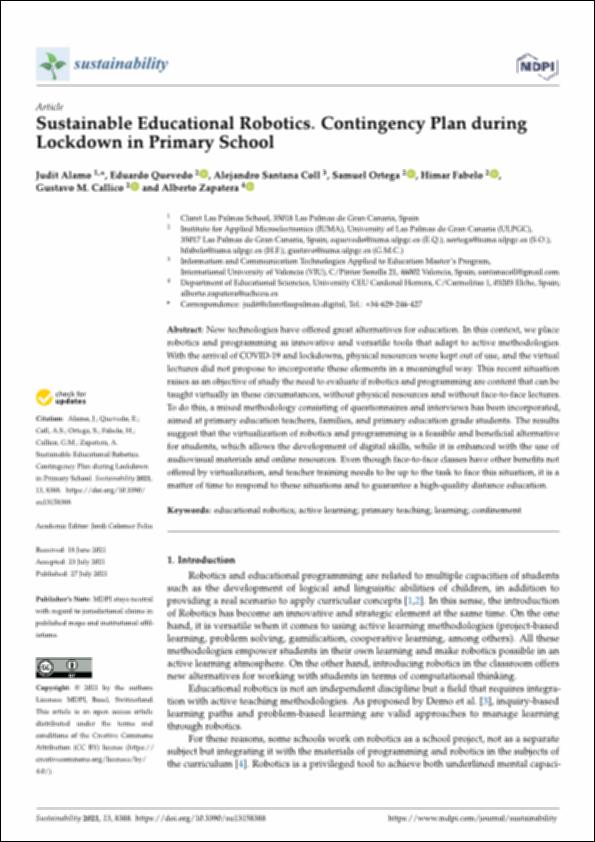Por favor, use este identificador para citar o enlazar este ítem:
http://hdl.handle.net/10637/13644Sustainable educational robotics : contingency plan during lockdown in primary school
| Título : | Sustainable educational robotics : contingency plan during lockdown in primary school |
| Autor : | Álamo Rosales, Judit Quevedo Gutiérrez, Eduardo Santana Coll, Alejandro Ortega Sarmiento, Samuel Fabelo Gómez, Himar Marrero Callicó, Gustavo Zapatera Llinares, Alberto |
| Materias: | Educación - Ayudas audiovisuales - Enseñanza primaria.; Robotics in education - Education (Primary); Robótica - Aplicaciones en educación - Enseñanza primaria.; Active learning - Education (Primary); Educational technology - Education (Primary); Education - Audio-visual aids - Education (Primary); Método activo (Educación) - Enseñanza primaria.; Tecnología educativa - Enseñanza primaria. |
| Editorial : | MDPI |
| Citación : | Alamo, J., Quevedo, E., Coll, A. S., Ortega, S., Fabelo, H., Callico, G. M. & Zapatera, A. (2021). Sustainable educational robotics : contingency plan during lockdown in Primary School. Sustainability, vol. 13, i. 15 (27 jul.), art. 8388. DOI: http://dx.doi.org/10.3390/su13158388 |
| Resumen : | New technologies have offered great alternatives for education. In this context, we place robotics and programming as innovative and versatile tools that adapt to active methodologies. With the arrival of COVID-19 and lockdowns, physical resources were kept out of use, and the virtual lectures did not propose to incorporate these elements in a meaningful way. This recent situation raises as an objective of study the need to evaluate if robotics and programming are content that can be taught virtually in these circumstances, without physical resources and without face-to-face lectures. To do this, a mixed methodology consisting of questionnaires and interviews has been incorporated, aimed at primary education teachers, families, and primary education grade students. The results suggest that the virtualization of robotics and programming is a feasible and beneficial alternative for students, which allows the development of digital skills, while it is enhanced with the use of audiovisual materials and online resources. Even though face-to-face classes have other benefits not offered by virtualization, and teacher training needs to be up to the task to face this situation, it is a matter of time to respond to these situations and to guarantee a high-quality distance education. |
| Descripción : | Este artículo se encuentra disponible en la siguiente URL: https://www.mdpi.com/2071-1050/13/15/8388 Este artículo pertenece al número especial "The Application of Robotics in Sustainability Education". |
| URI : | http://hdl.handle.net/10637/13644 |
| Derechos: | http://creativecommons.org/licenses/by/4.0/deed.es |
| ISSN : | 2071-1050 (Electrónico) |
| Fecha de publicación : | 27-jul-2021 |
| Centro : | Universidad Cardenal Herrera-CEU |
| Aparece en las colecciones: | Dpto. Ciencias de la Educación |
Los ítems de DSpace están protegidos por copyright, con todos los derechos reservados, a menos que se indique lo contrario.


